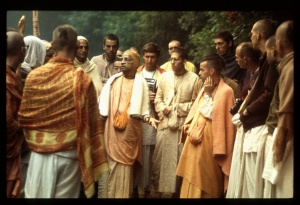CC Antya 8.21 (1975): Difference between revisions
(Vanibot #0027: CCMirror - Mirror CC's 1996 edition to form a basis for 1975) |
(Vanibot #0020: VersionCompareLinker - added a link to the Version Compare feature) |
||
| Line 2: | Line 2: | ||
<div style="float:left">'''[[Sri Caitanya-caritamrta (1975)|Śrī Caitanya-caritāmṛta (1975)]] - [[CC Antya (1975)|Antya-līlā]] - [[CC Antya 8 (1975)|Chapter 8: Rāmacandra Purī Criticizes the Lord]]'''</div> | <div style="float:left">'''[[Sri Caitanya-caritamrta (1975)|Śrī Caitanya-caritāmṛta (1975)]] - [[CC Antya (1975)|Antya-līlā]] - [[CC Antya 8 (1975)|Chapter 8: Rāmacandra Purī Criticizes the Lord]]'''</div> | ||
<div style="float:right">[[File:Go-previous.png|link=CC Antya 8.20 (1975)|Antya-līlā 8.20]] '''[[CC Antya 8.20 (1975)|Antya-līlā 8.20]] - [[CC Antya 8.22 (1975)|Antya-līlā 8.22]]''' [[File:Go-next.png|link=CC Antya 8.22 (1975)|Antya-līlā 8.22]]</div> | <div style="float:right">[[File:Go-previous.png|link=CC Antya 8.20 (1975)|Antya-līlā 8.20]] '''[[CC Antya 8.20 (1975)|Antya-līlā 8.20]] - [[CC Antya 8.22 (1975)|Antya-līlā 8.22]]''' [[File:Go-next.png|link=CC Antya 8.22 (1975)|Antya-līlā 8.22]]</div> | ||
{{CompareVersions|CC|Antya 8.21|CC 1975|CC 1996}} | |||
{{RandomImage}} | {{RandomImage}} | ||
==== TEXT 21 ==== | ==== TEXT 21 ==== | ||
<div class="verse"> | <div class="verse"> | ||
: | :"tumi--pūrṇa-brahmānanda, karaha smaraṇa | ||
:brahmavit hañā kene karaha rodana? | :brahmavit hañā kene karaha rodana?" | ||
</div> | </div> | ||
| Line 25: | Line 24: | ||
<div class="translation"> | <div class="translation"> | ||
"If you are in full transcendental bliss," he said,"you should now remember only Brahman. Why are you crying?""If you are in full transcendental bliss," he said,"you should now remember only Brahman. Why are you crying?" | |||
</div> | </div> | ||
| Line 32: | Line 31: | ||
<div class="purport"> | <div class="purport"> | ||
As stated in | As stated in Bhagavad-gītā, brahma-bhūtaḥ prasannātmā: a Brahman realized person is always happy. Na śocati na kāṅkṣati: he neither laments nor aspires for anything. Not knowing why Mādhavendra Purī was crying, Rāmacandra Purī tried to become his advisor. Thus he committed a great offense, for a disciple should never try to instruct his spiritual master. | ||
</div> | </div> | ||
Latest revision as of 04:11, 27 January 2020

A.C. Bhaktivedanta Swami Prabhupada
TEXT 21
- "tumi--pūrṇa-brahmānanda, karaha smaraṇa
- brahmavit hañā kene karaha rodana?"
SYNONYMS
tumi—you; pūrṇa-brahma-ānanda—full in transcendental bliss; karaha smaraṇa—you should remember; brahma-vit hañā—being fully aware of Brahman; kene—why; karaha rodana—are you crying.
TRANSLATION
"If you are in full transcendental bliss," he said,"you should now remember only Brahman. Why are you crying?""If you are in full transcendental bliss," he said,"you should now remember only Brahman. Why are you crying?"
PURPORT
As stated in Bhagavad-gītā, brahma-bhūtaḥ prasannātmā: a Brahman realized person is always happy. Na śocati na kāṅkṣati: he neither laments nor aspires for anything. Not knowing why Mādhavendra Purī was crying, Rāmacandra Purī tried to become his advisor. Thus he committed a great offense, for a disciple should never try to instruct his spiritual master.